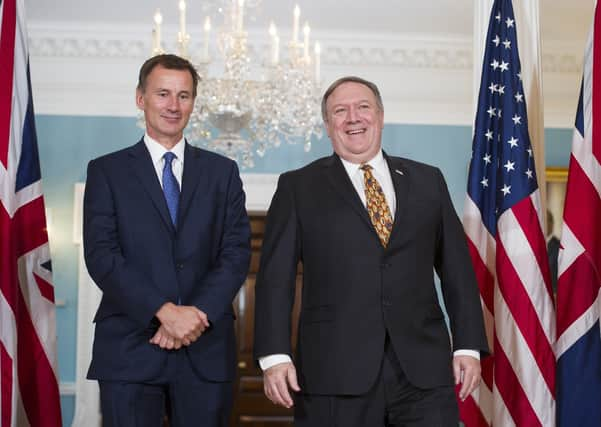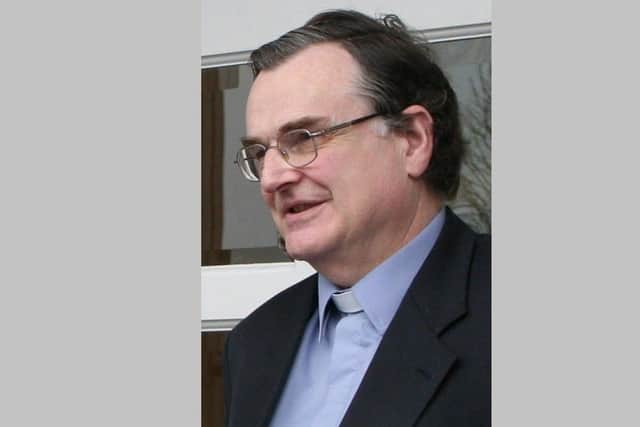Ian Ellis: It is welcome to see the joint calls for an end to religious persecution and the jailing of people on conscience grounds


The Alliance partners are formed of senior government representatives from a total of 27 countries in Europe, North and South America, Africa and the Middle East.
Rehman Chishti, the UK’s Special Envoy for Freedom of Religion or Belief, attended the launch on behalf of the government, the Foreign Office told me for this column.
Advertisement
Hide AdAdvertisement
Hide AdIn a press statement, Mr Pompeo recalled that in an address at an event on ‘The Global Call to Protect Religious Freedom’, held in September last year, President Trump had said: “Today, with one clear voice, the United States of America calls upon the nations of the world to end religious persecution, to stop the crimes against people of faith, release prisoners of conscience, repeal laws restricting freedom of religion and belief, protect the vulnerable, the defenceless and the oppressed.”


Whether or not one is a Donald Trump supporter, those sentiments are surely to be welcomed.
Founded on the fundamental human rights principle of freedom of religion or belief, the Alliance is intended to complement existing work on the issue within the United Nations and other organisations.
The document setting out the principles of the new Alliance refers to both “reactive” and “proactive” action.
Advertisement
Hide AdAdvertisement
Hide AdIn terms of the former, the document states that Alliance members “are committed to challenging persistent violations and abuses of the right to manifest one’s religion or belief” and “to seeking to persuade states to conform to international obligations and commitments”.
Also in terms of reactive measures, the Alliance will oppose restrictions on individuals’ freedom to change religion or belief, or to hold no belief, demonstrating solidarity with anyone victimised in this way. Again, Alliance members will advocate on behalf of individuals imprisoned or in other ways persecuted on account of their religion or belief and will promote measures to address discrimination on account of religion or belief in accessing justice, education, housing or employment.
In terms of proactive measures, the new Alliance is committed to promoting understanding of freedom of religion or belief issues and to promoting the cause together with other human rights, such as freedom of expression.
Speaking at the launch event, Mr Pompeo said: “Defending the right of all people to live their lives according to their conscience is one of this administration’s top priorities.”
Advertisement
Hide AdAdvertisement
Hide AdHowever, Religion News Service reported that there had been a mixed response to the initiative from the organisation, Humanists UK, quoting its chief executive, Andrew Copson, as saying that while there was much to welcome in the Alliance’s principles, including explicit protection of the non-religious, the group was concerned “that some members of the Alliance do not have good track records on upholding human rights, and have in fact used so-called ‘religious freedom’ as a justification for trampling on the rights and freedoms of others, including non-Christians, women, and LGBT people”.
In a statement last summer, Prime Minister Boris Johnson said that freedom of religion or belief is “at the heart of what the UK stands for”, adding: “We will do everything possible to champion these freedoms and protect civilians in armed conflict, including religious, ethnic or other minorities.”
Also last year, Church of England Bishop Philip Mountstephen issued the report of his independent review of religious persecution globally, specially commissioned by the Foreign and Commonwealth Office.
Then Foreign Secretary Jeremy Hunt said the report described “in harrowing detail the scale of the suffering and the moral obligation that rests on all of us” and Bishop Mountstephen, speaking at the same occasion at the Foreign Office, described “the systematic denial of freedom of religion or belief” as one of two “existential threats to human flourishing and harmonious communities in the world today”, the other being climate change.
Advertisement
Hide AdAdvertisement
Hide AdNearer to home, the issue of the freedom of businesses to opt out of same-sex marriage related work, such as in the hospitality industry, or in the case of council employees not wishing to officiate at a same-sex marriage, has recently come to the fore in Northern Ireland. It is surely inherently related to freedom of religion or belief because religion or belief is not just a matter of believing, it is also about acting out that faith.
This newspaper reported (February 21) concerns about the matter on the part of the Presbyterian church in particular. A Presbyterian church statement indicated: “To compel people of faith to compromise their strongly held religious convictions, or indeed force people of faith out of valuable roles in our community, runs contrary to what we all desire to be – an open, tolerant and pluralist society where everyone can play their part.”
The Presbyterian church surely was also right in its statement to call for “reasonable accommodations” in such matters.
It is a fraught subject but there can be no doubt that in every sphere of life conscience deserves profound respect.
• Canon Ian Ellis is a former editor of The Church of Ireland Gazette